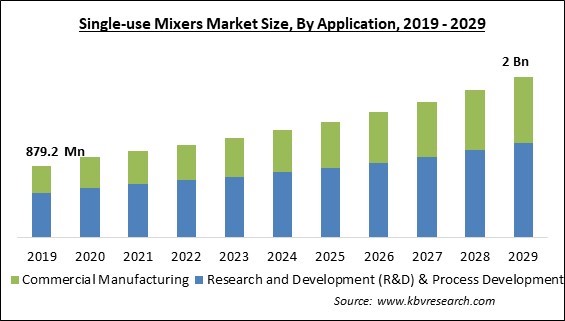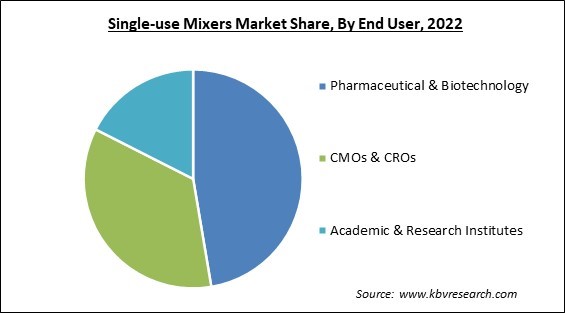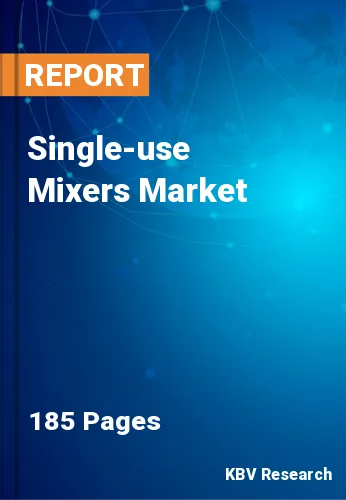The Global Single-use Mixers Market size is expected to reach $2 billion by 2029, rising at a market growth of 8.3% CAGR during the forecast period.
Asia Pacific is a promising region for the growth of single-use mixers because of substantial advancements in the pharmaceutical & biotechnology industries. Hence, APAC generated $307.4 revenue in 2022. Emerging countries like China and India have excellent growth prospects. This is primarily because these nations benefit from favorable government backing, skilled labor pools, increased private investment, and a growing willingness to outsource to emerging markets. Some of the factors impacting the market are advancements in technologies, growing demand for biopharmaceuticals, and waste disposing is a significant challenge.

The introduction of sophisticated single-use mixing systems has significantly increased the use of these devices in the biopharmaceutical sector. These systems address some drawbacks of conventional stainless-steel mixing systems, including the necessity of validation, cleaning, and maintenance, which can be time-consuming and expensive. According to UN statistics, by 2050, one in six people will be over 65 worldwide (16%), up from one in eleven (9%). There will be 426 million people who are 80 years of age or older in the world by 2050, which is predicted to triple from the current 143 million population. Thus, it is anticipated that the growing need for biopharmaceuticals will be the main factor driving the growth of the market. The outbreak of novel coronavirus was a big turning point for single-use technology, rising the demand for disposable & flexible single-use mixing systems. The pharmaceutical sector has developed the ability to be adaptable and flexible due to the pandemic, which was made possible by single-use systems. Therefore, the pandemic outbreak had a favourable impact on expanding the market for single-use mixers.
However, businesses engaged in biomanufacturing must cope with two difficulties when using single-use components, such as single-use mixers: disposal of solid waste and increased waste management costs. However, the reality is that only a very small portion of the plastic used globally is produced by companies that use single-use technologies. As a result, a sizable amount of solid waste is produced, and the biopharmaceutical business has trouble disposing of it.
By end-user, the market is categorized into pharmaceutical & biotechnology companies, CMOs & CROs, and academic & research institutes. In 2022, the pharmaceutical & biotechnology companies segment held the highest revenue share in the market. This is because biologics have had tremendous commercial success. The primary end-users of SUM and other single-use technologies are bio-manufacturers. Benefits like cost-effectiveness, compliance, adaptability, and acceptance of innovative approaches allow pharmaceutical and biotechnology to improve the manufacturing process. So, the business is expected to grow in the coming years due to the growing need for better, more efficient production of vaccines and other biologics.

Based on product, the market is segmented into mixing systems, and consumables & accessories. In 2022, the consumables & accessories segment registered the maximum revenue share in the market. This is due to the growing need to combine different fluids, like buffers, culture mediums, and procedures, for various research projects and the manufacturing of vaccines. Additionally, a lot of consumables and accessories, like mixing bags, can be tailored to a client's needs, lowering costs and lowering the danger of contamination, and ultimately contributing to environmental cleanliness.
On the basis of application, the market is fragmented into research and development (R&D) & process development, and commercial manufacturing. The commercial manufacturing segment garnered a significant revenue share in the market 2022. Over the past ten years, there has been a steady rise in technology adoption in industrial manufacturing. However, at the business level, several obstacles still prevent wider implementation. Disposable products' perceived greater costs compared to conventional stainless-steel equipment are one of the key causes of their slow acceptance. Despite being more expensive initially, disposable equipment frequently results in cost savings over time due to less cleaning and validation needs and quicker turnaround times.
| Report Attribute | Details |
|---|---|
| Market size value in 2022 | USD 1.1 Billion |
| Market size forecast in 2029 | USD 2 Billion |
| Base Year | 2022 |
| Historical Period | 2019 to 2021 |
| Forecast Period | 2023 to 2029 |
| Revenue Growth Rate | CAGR of 8.3% from 2023 to 2029 |
| Number of Pages | 185 |
| Number of Table | 330 |
| Report coverage | Market Trends, Revenue Estimation and Forecast, Segmentation Analysis, Regional and Country Breakdown, Companies Strategic Developments, Company Profiling |
| Segments covered | Product, Application, End User, Region |
| Country scope | US, Canada, Mexico, Germany, UK, France, Russia, Spain, Italy, China, Japan, India, South Korea, Singapore, Malaysia, Brazil, Argentina, UAE, Saudi Arabia, South Africa, Nigeria |
| Growth Drivers |
|
| Restraints |
|
Region wise, the market is analysed across North America, Europe, Asia Pacific, and LAMEA. In 2022, the North America region led the market by generating the highest revenue share. The high adoption of new technologies & biopharmaceuticals for the diagnosis and treatment of clinical diseases in the region is credited with the substantial share of this region. Furthermore, a sizable number of market participants in the area are continuously working to develop cutting-edge instruments for biopharmaceutical research. In addition, it is predicted that government research funding would support the regional market growth.
Free Valuable Insights: Global Single-use Mixers Market size to reach USD 2 Billion by 2029
The market research report covers the analysis of key stake holders of the market. Key companies profiled in the report include Sartorius AG, Danaher Corporation (Cytiva), Merck & Co., Inc., Thermo Fisher Scientific, Inc., Meissner Filtration Products, Inc., DrM, Dr. Mueller AG, Avantor, Inc., CerCell A/S (Stobbe Pharma GmbH) (Stobbe Group), Agilitech, and Holloway America.
By Product
By Application
By End User
By Geography
The Market size is projected to reach USD 2 billion by 2029.
Advancements in technologies are driving the Market in coming years, however, Waste disposing is a significant challenge restraints the growth of the Market.
Sartorius AG, Danaher Corporation (Cytiva), Merck & Co., Inc., Thermo Fisher Scientific, Inc., Meissner Filtration Products, Inc., DrM, Dr. Mueller AG, Avantor, Inc., CerCell A/S (Stobbe Pharma GmbH) (Stobbe Group), Agilitech, and Holloway America.
The Research and Development (R&D) & Process Development segment is leading the Market by Application in 2022 thereby, achieving a market value of $1.1 Billion by 2029.
The CMOs & CROs segment has shown the high growth rate of 8.8% during (2023 - 2029).
The North America segment dominated the Market by Region in 2022 and would continue to be a dominant market till 2029; thereby, achieving a market value of $695.4 million by 2029.
Our team of dedicated experts can provide you with attractive expansion opportunities for your business.

